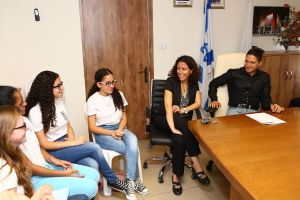For the first time, Wikimedia Israel (WMIL), the education department of the Municipality of Be’er Sheva (the 7th largest city in Israel), and the Ministry of Education have joined forces to establish the innovative Wikipedia in Education project.

During the past school year, approximately 350 students from ten 9th grade classes for excelling students learned how to write Wikipedia articles focused on geographical, historical and cultural subjects related to the city of Be’er Sheva, a well as articles on leading public figures in the city’s history. The lectures, editing workshops, and tutoring sessions were conducted in the framework of the student’s Hebrew language studies.
Students were divided into groups where they learned how to collect and research credible sources, and acquired academic writing skills. Students toured significant sites in the city, collected research material, and were guided by the chapter’s volunteers and their teachers, who were also tutored in these subjects. Students received lectures and editing workshops by ten volunteers of the Wikipedia community, who came from across the country to support and assist them in this unique project. Thirty new articles were moved to Wikipedia mainspace!
During the month of September, with the conclusion of the first year of the project, the Mayor of Be’er Sheva invited the WMIL volunteers, as well as representatives of both teachers and students to his office in order to thank them and show his appreciation for the project. The Mayor congratulated both students and volunteers, saying that the project constitutes “a perfect example skills utilized and in-depth learning that comes from fascinating subject matters”. The Mayor added that the city of Be’er Sheva was “proud of this project”.
WMIL sees the Wikipedia in Education project as paramount, as well as the recognition it receives from the educational community. We are happy that the students learned and experienced working with Wikipedia, and witnessed the great contribution it can make to their academic career, as well the contribution they can make to Wikipedia in turn. Added to their acquired experience in writing, both students and teachers got to know and experience an important pedagogical tool, and gained skills in the educated use of knowledge.
Together with Be’er Sheva Municipality, we hope to continue to implement the project in the next school year, and to see it established in other parts of the world. For that end, we are happy to share some of our conclusions and work procedures.
Project overview
The project began with a meeting of a steering committee convened by the Be’er Sheva Municipality to green-light the project, and create lesson plans in accordance with material taught in the 9th grade classes participating in the project.
- Teachers of the participating classes received a lecture and an editing workshop. An introductory lecture on Wikipedia was held in each of the participating classes.
- A project portal was created in the Hebrew Wikipedia.
- A list of missing articles was compiled and approved by the community members leading the project.
- 12 editing workshops were held for students, facilitated by additional Wikipedians and chapter volunteers. These articles were written as drafts and the students, divided into groups, worked on them together.
- The volunteers leading the projects held follow-up meetings with students, according to need.
- The drafts were moved into mainspace by the volunteers leading the project.
Main lessons learned
- Adjusting lesson plans to current material was crucial: editing in Wikipedia did not come across as just another school chore, and the concurring syllabus made the work easier and more fruitful for both teachers and students.
- The teachers in our projects underwent a four-hour lecture on Wikipedia and a short editing workshop. We believe that prepping teachers prior to their work with the students should be more thorough. They are crucial to the project’s success, and it is important that their knowledge of Wikipedia goes beyond the scope of the average user (talk pages, view history, categories, etc.). In our opinion, it is not necessary that teachers learn to edit or write articles.
- It is vital to create a schedule and adhere to it. We have not always been on schedule this last year, and consequently have failed to reach our goal of 40 articles. It is important to create a viable schedule for all parties involved – students, teachers and volunteers.
- Students’ enthusiasm is vital! Students must feel that they contribute to the expansion of knowledge by writing articles, and that many people will eventually read the content they have created. It is vital that this sentiment is enhanced during the project.
- During the project, we asked the teachers to locate students with the potential and will to continue editing in Wikipedia in the future. Some students were identified, and we maintain contact with them. It is preferable that in future, a volunteer is assigned to follow-up and encourage exceptional students.
- WMIL plans to hold a gathering of both the students who continued to edit after the workshop, and community volunteers.
- Two volunteers led and managed the project, and this proved to be counterproductive. The amount of work to be done during the project is substantial – coordinating with the different schools, editing articles, facilitating the workshops, participating in school activities, moving articles to mainspace, and more. Before projects of the kind are implemented in the future, it is recommended to consider the number of volunteers or staff members needed to lead and facilitate the project. This is a long, complex project, requiring long-term commitment.
We would like to take this opportunity to thank Danny Wax and Nimrod Rapaport, who led the project, assisted and supported the students and teachers in all matters, and of course, all our WMIL dedicated volunteers.
Michal Lester – Executive Director Wikimedia Israel

Can you help us translate this article?
In order for this article to reach as many people as possible we would like your help. Can you translate this article to get the message out?
Start translation